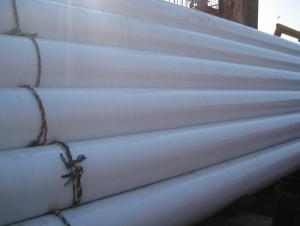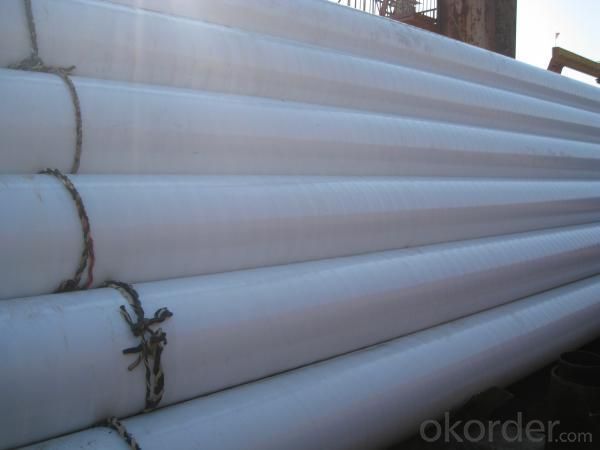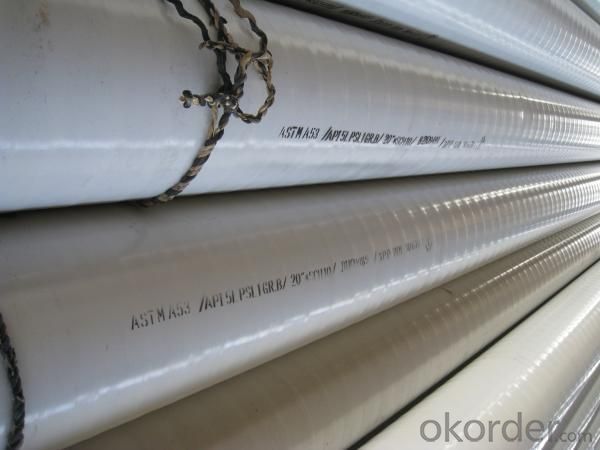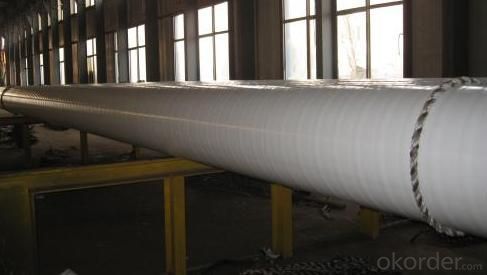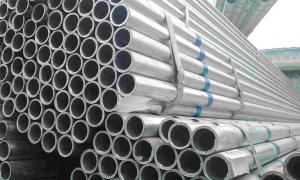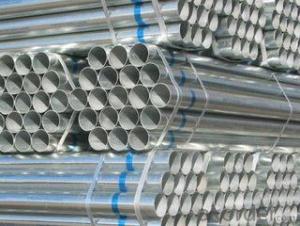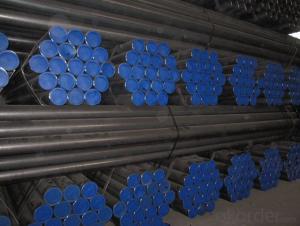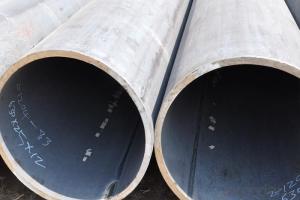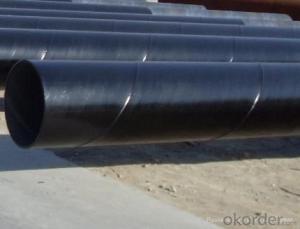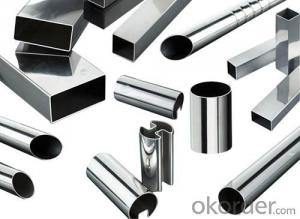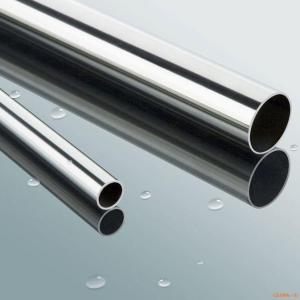Polypropylene Coating Steel Pipe
- Loading Port:
- Tianjin Port
- Payment Terms:
- TT or LC
- Min Order Qty:
- 50MT m.t.
- Supply Capability:
- 5000 Tons Per Month m.t./month
OKorder Service Pledge
OKorder Financial Service
You Might Also Like
Good quality of Polypropylene Coating Steel Pipe with best price.
Specifications of Polypropylene Coating Steel Pipe
|
order |
item |
performance |
test method. | |
|
2PE |
3PE | |||
|
1 |
peeling strength (N/cm)20±5℃ 50±5℃ |
≥35 ≥25 |
≥60 ≥40 |
DIN30670 |
|
2 |
cathodic disbanding(mm) (65℃,48h) |
≤15 |
≤10 |
SY/T4013 |
|
3 |
impact strength (J/mm) |
≥8 |
DIN30670 | |
|
4 |
bending resistant (2.5°) |
No cracking of polyethylene |
SY/T4013 | |
|
5 |
Pinhole (25kv) |
No leak |
DIN30670 | |
| Packaging Detail: | packing in bundle with steel strips; with seaworthy package at the end; could be done with your requirement for polypropylene coating steel pipe. |
| Delivery Detail: |
usually within 10-30 days after receipt of deposit, ASAP |
Factory and production line ,product picturers of Polypropylene Coating Steel Pipe shown as below,
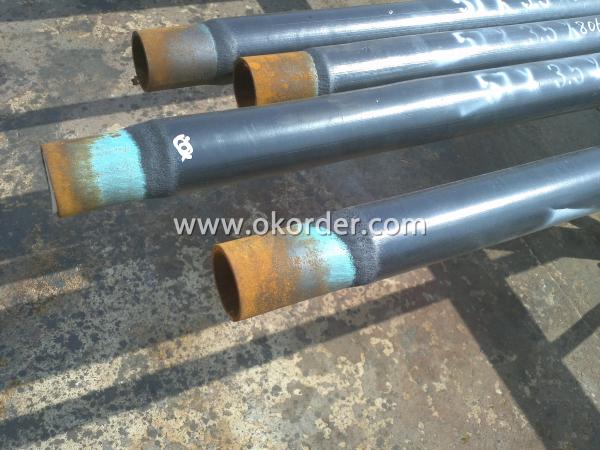
Pipe with Polypropylene Coating
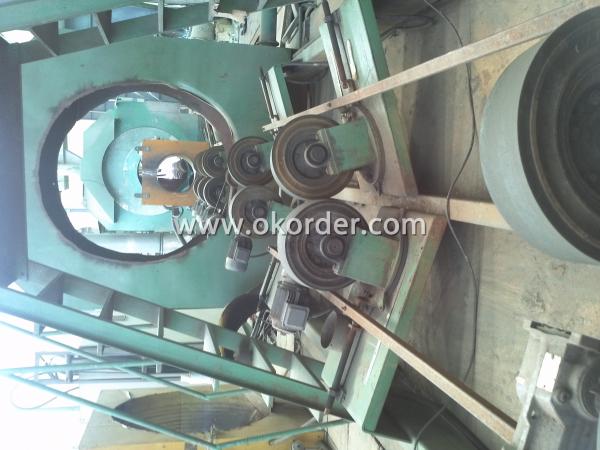
Production line machine.High technology with imported machine.
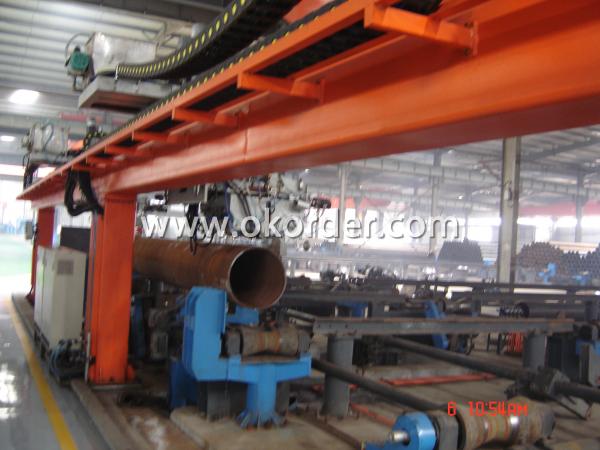
Welcome to visit our company and order Polypropylene Coating Steel Pipe from us.
- Q: Can steel pipes be used for oil drilling operations?
- Yes, steel pipes are commonly used for oil drilling operations due to their strength, durability, and resistance to high pressure and extreme temperatures.
- Q: How are steel pipes used in the manufacturing of HVAC systems?
- Steel pipes are commonly used in the manufacturing of HVAC systems for various purposes. They are primarily used for transporting fluids such as water, refrigerants, and gases throughout the system. Steel pipes provide durability and strength, ensuring the safe and efficient transfer of these substances. Additionally, steel pipes are often used for structural support, acting as a framework for the HVAC system. Overall, steel pipes play a crucial role in the manufacturing of HVAC systems by facilitating fluid transportation and providing structural stability.
- Q: How are steel pipes recycled at the end of their life cycle?
- Steel pipes are typically recycled at the end of their life cycle through a process called steel recycling. This involves collecting the used pipes, separating them from other materials, and then melting them down to be formed into new steel products. The recycling process not only helps conserve valuable resources but also reduces the need for new steel production, making it an environmentally sustainable solution.
- Q: How are steel pipes used in the agriculture sector?
- Steel pipes are commonly used in the agriculture sector for various purposes such as irrigation systems, water transportation, and structural support for greenhouse structures. They are also used for the construction of livestock enclosures and handling equipment. Overall, steel pipes play a crucial role in ensuring efficient and reliable operations in the agriculture industry.
- Q: What are the common materials used for pipe fittings in steel pipes?
- The common materials used for pipe fittings in steel pipes include carbon steel, stainless steel, and alloy steel. Carbon steel pipe fittings are widely used due to their affordability, strength, and durability. They are suitable for various applications, including oil and gas, petrochemical, and water distribution systems. Stainless steel pipe fittings are highly resistant to corrosion and are commonly used in industries that require a high level of hygiene, such as food and beverage and pharmaceutical industries. Alloy steel pipe fittings are composed of multiple elements, such as chromium, nickel, and molybdenum, to enhance their strength and resistance to corrosion. These fittings are often used in high-pressure and high-temperature applications, such as power plants and chemical plants. Overall, the choice of material for pipe fittings in steel pipes depends on the specific requirements of the application and the environment in which they will be used.
- Q: What are the factors to consider when selecting pipe materials for high-temperature applications?
- When choosing pipe materials for high-temperature applications, several factors must be taken into account. First and foremost, the thermal conductivity of the material is crucial. Efficient heat transfer and prevention of heat buildup are necessary in high-temperature applications, therefore materials with high thermal conductivity, like copper and stainless steel, are commonly used in these installations. Secondly, it is important to consider the material's resistance to thermal expansion. Pipes tend to expand when exposed to high temperatures, so selecting materials with low thermal expansion coefficients is vital to avoid deformation and potential pipe failure. Carbon steel and stainless steel are suitable options as they exhibit relatively low thermal expansion. The material's mechanical strength and resistance to corrosion should also be considered. High temperatures can weaken or corrode certain materials, leading to structural failures. Therefore, it is essential to choose materials, such as alloy steel and nickel-based alloys, that can withstand high temperatures without compromising their mechanical strength or corroding easily. Additionally, the cost and availability of the materials should be taken into account. Some high-temperature pipe materials may be expensive or hard to obtain, which can impact the project's budget and timeline. It is important to find a balance between the desired material properties and the project's financial and logistical constraints. Lastly, it is crucial to consider the specific application requirements and industry standards. Different industries may have guidelines or regulations regarding pipe materials for high-temperature applications. Ensuring that the selected materials comply with these standards is essential for safety, reliability, and adherence to industry regulations. To conclude, the factors to consider when choosing pipe materials for high-temperature applications include thermal conductivity, resistance to thermal expansion, mechanical strength, resistance to corrosion, cost and availability, and compliance with industry standards. By carefully evaluating these factors, one can select the most suitable pipe material to ensure efficient and reliable operation in high-temperature environments.
- Q: Can steel pipes be used for pharmaceutical manufacturing?
- Yes, steel pipes can be used for pharmaceutical manufacturing. Steel pipes are commonly used in various industries, including pharmaceutical manufacturing, due to their durability, strength, and resistance to corrosion. In pharmaceutical manufacturing, steel pipes are primarily used for fluid transportation, such as the transfer of chemicals, solvents, and other raw materials. They are also used for the distribution of process water, steam, and other utilities. Stainless steel pipes are particularly preferred in pharmaceutical manufacturing as they are highly resistant to corrosion and can withstand high temperatures and pressures. Moreover, stainless steel pipes have smooth surfaces, which prevent the accumulation of particles and facilitate easy cleaning and sterilization, essential requirements in pharmaceutical production. Overall, steel pipes are a reliable and suitable option for pharmaceutical manufacturing due to their robustness, resistance to corrosion, and ability to meet the stringent cleanliness and hygiene standards of the industry.
- Q: What are the safety precautions for handling steel pipes?
- Some safety precautions for handling steel pipes include wearing appropriate personal protective equipment such as gloves, safety glasses, and steel-toed boots. It is also important to use proper lifting techniques to prevent strain or injury, as steel pipes can be heavy. Additionally, ensuring a clear and organized workspace, as well as securing the pipes properly during transportation, can help prevent accidents or damage.
- Q: Galvanized steel pipe in addition to good rust resistance, what are the advantages?
- Because the zinc has been plated outside the steel tube, the time for oiling or painting outside is omitted, and the construction is more convenient;
- Q: How are steel pipes used in the transportation of liquids and gases?
- Due to their durability, strength, and resistance to corrosion, steel pipes find wide applications in the transportation of liquids and gases. Various industries such as oil and gas, water supply, and chemical processing commonly employ them. For the transportation of liquids, steel pipes serve as conduits for crude oil, refined petroleum products, water, and other fluids. These pipes are designed to withstand high pressure and maintain the integrity of the liquid being transported. The smooth inner surface of steel pipes minimizes friction, enabling efficient flow and reduced energy consumption. Moreover, the strength of steel pipes ensures that they can support the weight of the liquid without deformation or failure. In gas transportation, steel pipes are indispensable for the safe conveyance of natural gas, propane, and other compressed gases over long distances. These pipes are engineered to endure high pressures and extreme temperatures. They are also designed to prevent leakage, which is of utmost importance when dealing with flammable or toxic gases. The strength and durability of steel pipes make them ideal for withstanding the stress and strain that may occur during gas transportation. Additionally, steel pipes are frequently utilized in the construction of pipelines for long-distance transportation of liquids and gases. These pipelines can span hundreds or even thousands of kilometers, and steel pipes are the preferred choice due to their high strength and long-term reliability. They can bear the weight of the pipe and the substance being transported, as well as external forces such as soil pressure and temperature fluctuations. In summary, steel pipes play a vital role in the transportation of liquids and gases. Their durability, strength, and resistance to corrosion make them the preferred choice for conveying various substances over long distances. Whether it is for oil and gas, water supply, or chemical processing, steel pipes ensure the safe and efficient transportation of fluids and gases, contributing to the functioning of various industries and economies worldwide.
1. Manufacturer Overview
| Location | Cangzhou,China |
| Year Established | 2010 |
| Annual Output Value | 200 million square meters |
| Main Markets | Main land;Middle East;Southeast Asia |
| Company Certifications | ISO 9001 |
2. Manufacturer Certificates
| a) Certification Name | |
| Range | |
| Reference | |
| Validity Period |
3. Manufacturer Capability
| a) Trade Capacity | |
| Nearest Port | Tianjin |
| Export Percentage | 41% - 50% |
| No.of Employees in Trade Department | less than 10 |
| Language Spoken: | English;Chinese |
| b) Factory Information | |
| Factory Size: | 20,000 square meters |
| No. of Production Lines | 2 |
| Contract Manufacturing | OEM Service Offered;Design Service Offered |
| Product Price Range | Average |
Send your message to us
Polypropylene Coating Steel Pipe
- Loading Port:
- Tianjin Port
- Payment Terms:
- TT or LC
- Min Order Qty:
- 50MT m.t.
- Supply Capability:
- 5000 Tons Per Month m.t./month
OKorder Service Pledge
OKorder Financial Service
Similar products
Hot products
Hot Searches
Related keywords
